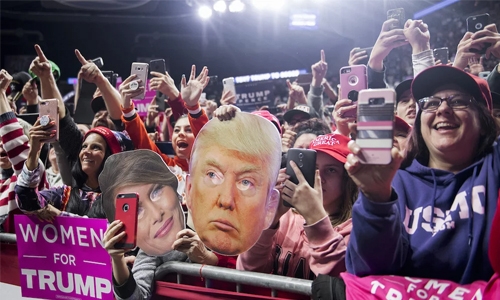Taking the pulse of a divided America
I arrived in New York immediately prior to this month’s midterm elections, expecting to encounter polarisation and unease. Yet the climate I encountered was infinitely more fraught than I thought possible. One family I visited epitomised America’s cultural divide: Two brothers in their late teens who could scarcely communicate with each other, such was their antipathy to each other’s views. Both were locked in bedrooms following their own versions of the truth online.
If the news was turned on in the living room, one of the boys would immediately walk out, depending on the channel chosen. In wider society, I encountered levels of political extremism that I’d never previously associated with the Western world — not just among Donald Trump supporters obsessing over immigration, but also among those hostile to their president, yet glued to every titbit of news concerning Trump. Following the antics, missteps and outbursts of this unconventional leader has become a national obsession.
Immigrant taxi drivers commented that, in past decades, even the police used to be friendly and helpful. Yet today they scarcely dare admit that they are Mexican or Muslim, such are the levels of anti-immigrant hostility in some quarters. I overheard so many discussions expressing depression and unease about where the nation was going. One lady commented that the only thing keeping her sane was upping the dosage of pills prescribed by her doctor. New Yorkers worry about the economy being artificially stimulated by slashing taxes and boosting spending.
Yet how long is such reckless fiscal policy sustainable? Where will trade wars, tariffs, sanctions and disputes with allies leave the economy? And who will take the minimum-wage jobs now immigrants are marginalised? Why is Trump punishing his home city by starving New York’s decrepit infrastructure of funding? Midterm elections are often rather dull affairs, yet I have never seen people so mobilised; including many who had never bothered to vote before. The streets emptied as everyone sat glued to their TV channels of choice, waiting for first indications of results, and how these would be spun.
Elsewhere, in pro-Trump rural America, the tense and angry mood was remarkably similar. Among divided communities and families, one can cut the tension with a knife. People go to pathological lengths to avoid discussing politics with each other, even though there is only one thing on their mind. Friends asked me how Europeans perceived Trumpian America: Could the US ever regain its standing after taking such a reputational hit? Trump’s disastrous Paris trip highlighted American isolation, with French President Emmanuel Macron using his Remembrance Day speech to lecture Trump about the catastrophic consequences of chauvinistic nationalism.
Trump retaliated with a flurry of anti-French tweets on the same day that France was observing the anniversary of the 2015 Paris terrorist attacks that killed 137 people. I met people who opposed and others who supported Trump’s sanctions against Iran, yet even supporters worried that Trump’s terrible relations with Europe had resulted in the EU actively undermining this sanctions regime. Meanwhile, sanctions in the absence of a containment strategy risked enriching the Quds Force and Iranian proxies, which were already positioning themselves to profit from oil smuggling and sanctions evasion activities.
On North Korea, Trump enjoyed boasting about his wonderful relationship with a murderous dictator after the Singapore summit; but isn’t Kim Jong Un still expanding his nuclear capacities and testing offensive weapons? And I couldn’t even ask about Russia without being met with a volley of expletives and unprintable comments about the “unnatural and treasonous” relationship between Trump and Vladimir Putin. America’s mood looks set to turn even darker in the coming months, as an ascendant Democratic Party goes on the offensive in the House of Representatives; numerous White House officials are reportedly on the verge of losing their jobs; and Robert Mueller’s Russia investigation reaches its inevitably explosive conclusion.
Without evidence, Trump and senior Republicans have accused Democrats of trying to fraudulently steal the elections in states like Georgia, Florida and Arizona. Those I spoke to worried that such attempts to undermine the electoral process were the sort of thing that happened in “some African banana republic,” not in a mature democracy like America. Having spent much of my journalistic career in press conferences, I watched with horror as the president harangued CNN’s correspondent for daring to ask about Russia, before his access to the White House was confiscated.
The freedom of the media to ask challenging questions to national leaders — enshrined in the US Constitution’s First Amendment — goes to the heart of preserving an open democracy. Even the slavishly pro-Trump Fox News sided with CNN here; and indeed a federal judge has demanded that the journalist’s press pass be reinstated. All this represents the progressive subversion of political due process, freedom of the media, and the US constitution itself.
With numerous European states following America down the path of right-wing authoritarian populism, dictators around the world can sleep soundly knowing that human rights and democratic values no longer matter. The clock now begins ticking down to the 2020 US elections. Can Democrats sustain current levels of mobilisation and resistance? Will the public mood further sour against Trump’s antics? Or will his efforts ultimately allow him to once again steamroller his opponents on the path to victory?
Related Posts

